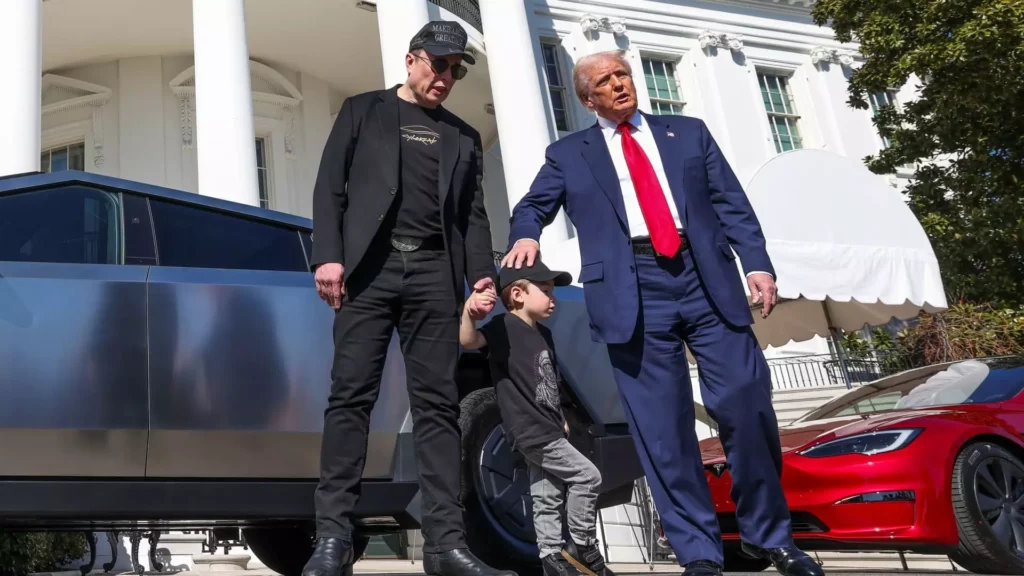In today’s intricate web of economic uncertainty and perplexing trade guidelines, Elon Musk stands out not just as a technological pioneer but as a provocateur willing to confront the elephant in the room. His candid remarks during Tesla’s first-quarter earnings call on tariffs underscore a critical tension that has ensnared businesses globally. While traditional automakers may hem and haw, Musk’s approach resonates with the urgency of straightforward communication. He unequivocally opposes arbitrary tariffs but acknowledges a sobering reality: the fate of trade policy ultimately hinges on the President of the United States. This observation acts as a mirror reflecting a wider sentiment prevalent among corporations, illustrating just how susceptible market stability can be to erratic trade regulations.
Tesla vs. Traditional Automakers: A Comparative Analysis
Operating from a place of relative strength compared to stalwarts of the automotive industry, Tesla has established a localized supply chain configuration spanning North America, Europe, and China. This diverse foundation is commendable, yet financial disclosures paint a more grim portrait. A disconcerting 20% drop in automotive revenue, alongside a striking 71% fall in net income, exposes an unsettling truth: strategic positioning alone cannot insulate a company from the broader economic climate. These deteriorating figures serve as a wake-up call—a blunt reminder that even visionary strategies can falter when faced with external pressures that ripple across global markets.
Musk’s critiques extend beyond the realm of tariffs; they are allegorical of a larger struggle engulfing international trade. He opines that tariffs, while detrimental, are merely symptoms of a broader malaise: predatory trade practices employed by other nations. His past tiffs with figures like Peter Navarro, whose trade philosophy diverges sharply from Musk’s, further illuminate the anguish felt within trade discussions. Musk’s biting remarks casting Navarro as “dumber than a sack of bricks” underscores a frustration that many in the business community cannot ignore: the need for a rational, cooperative stance in navigating trade hurdles.
Resilience in the Face of Tariffs and Market Volatility
While Tesla appears buffered from some tariff-related headaches—largely due to its domestic manufacturing strategy—this protective veil may only be partially effective. The reliance on essential materials sourced from Mexico and China unveils a facade of security that might not hold under closer scrutiny. The striking 36% drop in Tesla’s stock during the first quarter serves as a narrative of investor disquiet. Having thrived on a previous trajectory of optimism, investors are now grappling with the realities of volatility, raising essential questions about Tesla’s potential to maneuver these treacherous waters.
In acknowledgment of these challenges, Musk highlighted the negative implications tariffs impose on Tesla’s energy sector, particularly regarding lithium iron phosphate (LFP) battery components. His insight reflects a proactive mindset; he recognizes the urgency to transition to domestic manufacturing solutions for these critical materials. However, a stark admission looms: current domestic sourcing can only serve a fraction of the company’s demand. The intrinsic lesson here underscores not just the importance of diverse supply chains, but a necessity for innovation rooted in resilience towards historical vulnerabilities.
A Vision for Stable Tariff Structures
Musk’s advocacy for predictable tariffs and the principles of free trade speaks volumes about his economic philosophy. He recognizes an essential truth—the stability offered by clear, consistent trade regulations fosters an environment conducive to growth. His belief that sound advice can aid policymakers suggests a dual role that business leaders can play in shaping effective trade legislation. Yet, it is a sobering reminder that in the realpolitik of trade, industry leaders often find themselves reacting to impervious forces, navigating a chessboard fraught with risks.
The potential of Musk’s ambitious vision to construct a lithium refinery in Texas exemplifies his commitment to bolstering sustainable supply chains. While he humorously deflected responsibility for total self-sufficiency—”we’re not growing rubber trees and mining iron yet”—his statements embody a serious dedication to innovative solutions aimed at reducing the company’s dependency on geopolitical capitulation. Moreover, his ongoing efforts to establish alternative supply chains outside of China underscore a forward-thinking approach indispensable to navigating the evolving landscape of international commerce.
Elon Musk’s Provocation: An Industry in Flux
Musk’s expressions resonate beyond just the confines of a single earnings call; they echo a clarion call for a business community that must remain actively engaged with the policy landscape. The exponential implications of tariffs and trade policy are not simply items on a ledger for corporations; rather, they are existential inquiries demanding proactive involvement with an often-quixotic political realm. As Tesla presses forward amidst uncertainty, the crossroads of innovation, resilience, and policy advocacy remain bright, albeit challenging, paths that must be transcended in these turbulent times.









Leave a Reply